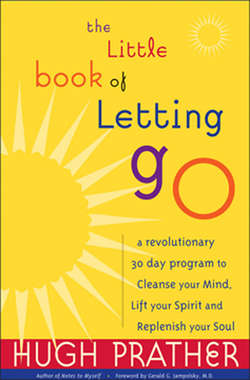Читать книгу The Little Book of Letting Go - Hugh Prather - Страница 17
На сайте Литреса книга снята с продажи.
Letting Go of the Fear of Letting Go
ОглавлениеLetting go of judgment and control has no downside. What possible harm could come from practicing the simplicity of not having to be somebody, and of not requiring our friends and family to be other than who they are? We can cross the street without becoming a “pedestrian.” We can drive to work without becoming a “commuter.” We can walk the dog without becoming a “pet owner.” And we can extend our hand to our child without becoming “the parent.”
We only need to be as we were created—effortless, present, and free. No additional history, status, or attitude is required. What need have we to make money, education, religion, or race the banner of our righteousness? What need have we to stand apart from one another, wrapped in our childhood damage like a bloody cloak? Our childhood is over. All our accumulated differences are like dust on the skin, and the members of our human family hold out their hearts to us each day.
If we could dine out without turning into the “customer,” we would have a chance of feeling our equality with the person serving us. If we could report for jury duty without turning into the “citizen” who must deal with a “county clerk,” we would have a chance of seeing our oneness with the person who stands before us. Our identity can change like the distorted reflections in a line of storefront windows—or it can remain the same, like the lovely image of a child held forever in the heart of a parent.
Those in our lives who make the most meaningful and enduring contributions to who we are have dared to take their place among equals. The world stares in amazement at the glittering adornments of the ego, but only those who walk beside us in love and equality reach our hearts and transform us.
Suggested time: 1 or more days
The next time you are in a store, restaurant, mall, workplace, or just walking down a crowded sidewalk, pick out one or, if you have time, two or three individuals, and, in turn, practice becoming them for a few moments. How does it feel to wear their clothes (can you feel the cloth against your skin?), to have their hair or no hair, to walk as they walk or cannot walk, to gesture as they gesture? Do their eyes occasionally look to the side or dart around like all of our eyes do, as if the one inside who is looking out is a little uncertain, a little vulnerable? It's a very big, unpredictable world out there. Without analysis, inferiority, condescension, or perspective—in other words, without thinking about it—what is it like to feel as they feel and think as they think?
Try doing this today, and if it is enjoyable, for the next few days. Perhaps you will be struck with ordinariness. Perhaps you will sense that we are pretty much alike, and that we are all in this together. And perhaps you will feel a little sad for the occasional person you see who tries so hard to stand rigidly apart, only to find loneliness and isolation.
